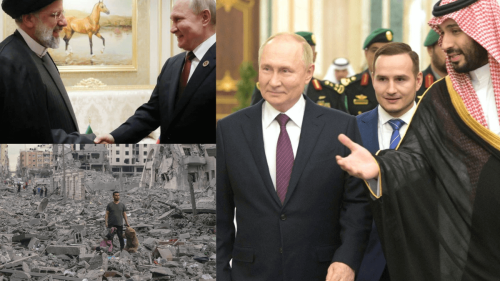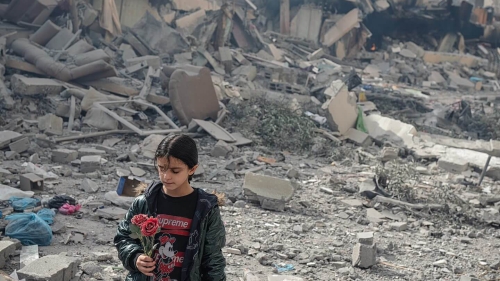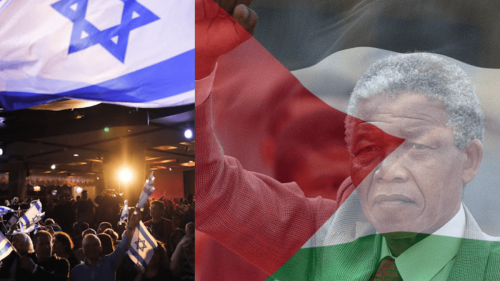Freedom for Chechnya: The least price of Russian war crimes
For too long now, have the Chechen people been the victims of imperialist Russia's wrath. For too long the international community has ignored their agony, their basic human rights and their struggle to be free.
For six months now, in this second round of Russian invasion in Chechnya, both Muslim and Western leaders have stoically endured what they euphemistically called "the use of excessive force." Now disturbed by the latest revelation of possible Russian war crimes, they are calling for an investigation of summary execution, rape and looting by Russian troops in Chechnya. This is a welcome move, but one that is too late, too weak and too little for the Chechen people.
Last week, a television broadcast showed footage of Russian soldiers piling mutilated Chechen bodies into a mass grave. The men's ankles were bound with metal wires, some bodies had missing ears, and a military truck was dragging a dead man across a field.
What this shocking footage showed is the tip of a huge iceberg of Russian atrocities in Chechnya. It fits the pattern of disturbing reports that have consistently trickled out of Chechnya for the past six months. Since the beginning of the invasion, Human Rights Watch (HRW) and other observers have reported that Russian forces have violated all norms of warfare and international conventions, using massive firepower against civilians everywhere. On October 22, 1999, for example, Russian missiles killed 140 and wounded 400 civilians at a market place, a hospital and other areas of the Chechen capital, Grozny.
When Russian forces took over Grozny after blazing it out of the landscape, HRW reported that Russian soldiers had executed at least 38 civilians. Earlier, HRW and other human rights observers reported that Russian forces were killing civilians en masse, raping Muslim women and plundering Chechen properties.
On February 12, AFP reported ruthless Russian bombing of villages through which the Chechen freedom fighters passed: "Each village was bombarded by Russian forces, killing a total of at least 400 civilians, while the rebels, seeking to avoid drawing Russian fire on inhabited areas, did not shoot back, the witnesses said." Furthermore, Russian forces have implemented a process by which all Chechen males from the ages of 10 to 70 are swept into concentration camps called "filtration" centers, barring them from traveling in or out of Chechnya. Human rights workers have reported that many such men detained at Russian checkpoints have disappeared.
Furthermore, Physicians for Human Rights reported Sunday that it had medical evidence of torture, abuse and summary executions of Chechen civilians by Russian forces. The group interviewed 326 Chechen civilians and used physical exams to corroborate the claims of these civilians.
Because of the Russian blockade of information flow to and from Chechnya, we do not know the magnitude of Russian war crimes. We do not know how many of the 40,000 people trapped in Grozny have perished and how many more have perished in the rest of Chechnya. Like Andrei Babitsky, the reporter who worked for the U.S.-funded Radio Liberty, journalists who dare to tell the truth risk being detained or harassed by the Russian forces.
Yet, international governments are not matching their words of criticism with action. The Council of Europe has sent another envoy -- its human rights commissioner Alvaro Gil-Robles -- "to visit refugee camps in Ingushetia." They know fully well that, like Lord Russel-Johnston, the Council's president who visited the Russian occupied areas of Chechnya in January, Gil-Robles will see what the Russians want or tell him to see. He will not see the remnants of Russian war crimes, nor will he talk to any Chechen government official.
The U.S. government has called the video footage "very troubling" and limited its "outrage" to a sympathetic call for an independent inquiry into the allegations of ongoing Russian abuses in Chechnya. Earlier, when Russia announced the institution of "filtration centers," the United States simply asked for a "clarification" of this policy. And the Canadian government welcomed Russian assurances that the video would be handed over to military prosecutors for investigation. That is no better than asking rapists and thugs to be their own judges.
The Western governments' criticisms of Russia are nothing more than spin to manage their own images as the defenders of human rights. They have consistently ignored the Chechen people's pleas for help and instead have supported both the 1994-96 and current invasions of Chechnya by giving Russia unabated foreign aid.
More disturbingly, Muslim world voices have remained as mute as ever. Even in Muslim countries that have democratic environments, people have remained largely uninformed as to the magnitude of Russian war crimes.
We must not forget that Russia remains a last bastion of colonial imperialism in the current post-colonial world. Russia conquered Chechnya in 1859 and has since killed tens of thousands of Chechens every time they have demanded freedom.
In 1944, for example, Stalin's Russia killed 250,000 of 800,000 Chechens while deporting the entire population to central Asia in freezing cargo trains. Stalin accused the Chechens of "collaborating with the Nazis," though it was he who "in 1939 had entered into a secret agreement with Nazi Germany that recognized Soviet hegemony over" the Baltic States (Encyclopedia Britannica, 1999).
The Chechens declared independence from Russia in 1991 when the other former Soviet republics broke with Russia. The West swiftly recognized the Baltic republics (Estonia, Latvia, and Lithuania) but mysteriously ignored the call of Chechnya to be free. Remember, Russia conquered both the Baltic and the North Caucasus regions in the 18th century.
Heeding the West's warning, Russia did not invade the Baltic States. As the West did not support Chechnya, Russia maintained an economic blockade on the republic until invading it on December 11, 1994. In that invasion, the Kremlin killed another 80,000 people, destroyed Chechnya's infrastructure, but eventually withdrew forces from Chechnya by signing a peace treaty in August 1996. The Chechens elected their present government in internationally monitored democratic elections held in 1997.
Russia reneged on the treaty and began the current invasion in October 1999. They accused the Chechens of crimes in Chechnya and of terrorist attacks in Russia without providing evidence. Yet, the crimes that happened in Chechnya were a miniscule fraction of those happening in Moscow itself. And, according to numerous Russian citizens, the Kremlin itself staged the terrorist bombings in Russian cities to justify their military campaign in Chechnya, to divert attention from their massive corruption, and to make Yeltsin crony Vladimir Putin the president of Russia.
In the absence of a Nuremberg trial of Putin and his monsters, the smallest price Russia must pay for its war crimes is freedom in Chechnya. By committing the atrocities, the Russians have lost whatever ridiculous claim they have there. Like the peoples of Estonia, Latvia, Lithuania, and East Timur, the Chechens deserve to be free. It is unfair and unethical for humanity to support the freedom of all these peoples and ignore that of the Chechens.
On February 20, two hundred French intellectuals and personalities signed a text condemning Russian actions in Chechnya and denouncing Putin for continuing the bloody work of Stalin. Like the French personalities, let us all speak out loud for the freedom of Chechnya. Let our governments take concrete action for an end to Russian carnage and colonialism in Chechnya.
Mohammad A. Auwal is an assistant professor in the Department of Communication Studies at California State University, Los Angeles and is a regular columnist for iviews.com

















